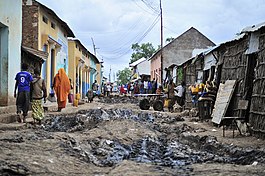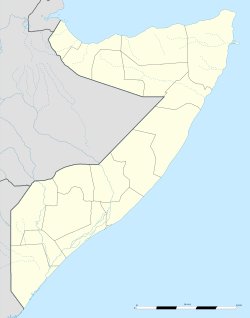Wanlaweyn
This article needs additional citations for verification. (June 2020) |
Wanlaweyn
Wanliwiing | |
|---|---|
Town | |
| Coordinates: 2°37′00″N 44°54′00″E / 2.61667°N 44.90000°E | |
| Country | |
| Region | Lower Shebelle |
| District | Wanlaweyne |
| Population | |
• Total | 26,700 |
| Time zone | UTC+3 (EAT) |
Wanlaweyn (Maay: Wanliwiing) is a town in the northern Lower Shebelle region of Somalia. Situated around 90 km (50 miles) northwest of the capital Mogadishu, it is the center of the Wanlaweyn District.

The Shanta Alemo (Somali: Shanta Caleemo), (Italian: Shanta Alemo), (Arabic: شانتا أليمو shanta 'alemo means 5 leaves means 5 clan consist of hubeer clan , erdho clan , hifmage clan , jambulul clan ) or shan aleen is one of the largest Somali clans, whose origins trace back to 5 clans leaving together . The Shanta Alemo clan belong to the Digil and mirifle family of clans.
Demographics
[edit]Wanlaweyn has a population of around 26,700 inhabitants.[1] The broader Wanlaweyn District has a total population of 250,643 residents.[2] The town is predominantly inhabited by the makaahiil and calofi clan sub-division of the Gaalje'el Somalis.
History
[edit]During the 1961 Somali constitutional referendum, in order to secure a substantial "Yes" vote for southerners, the small town reported 100,000 votes.[3] This was higher than total ballots cast in the North (Somaliland), therefore Northerners became suspicious of the political nature of Southerners.[3] As a result, coining the new term "Wanlaweyn" for Southerners, which is still used today.[3][4]
Notes
[edit]- ^ "Somalia City & Town Population". Tageo. Retrieved 4 October 2013.
- ^ "Regions, districts, and their populations: Somalia 2005 (draft)" (PDF). UNDP. Retrieved 21 September 2013.
- ^ a b c Abdullahi, Mohamed Diriye (2001). Culture and Customs of Somalia. Greenwood Publishing Group. ISBN 978-0-313-31333-2.
- ^ Adam, Hussein Mohamed (2008). From Tyranny to Anarchy: The Somali Experience. Red Sea Press. ISBN 978-1-56902-288-7.

